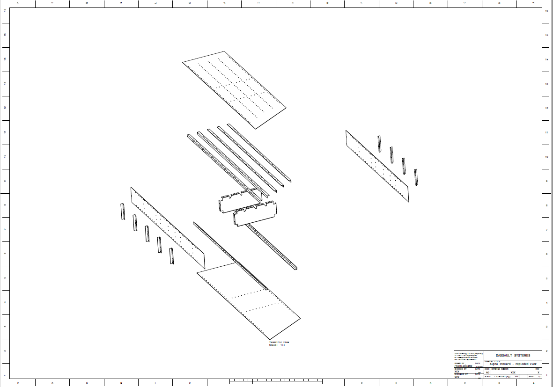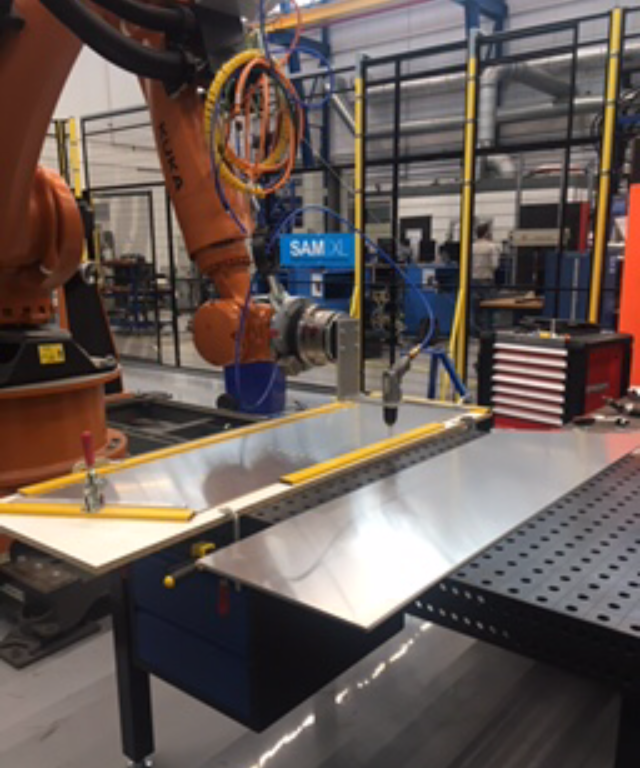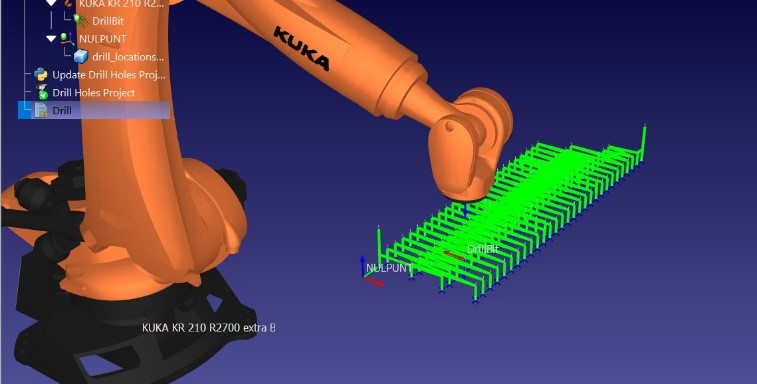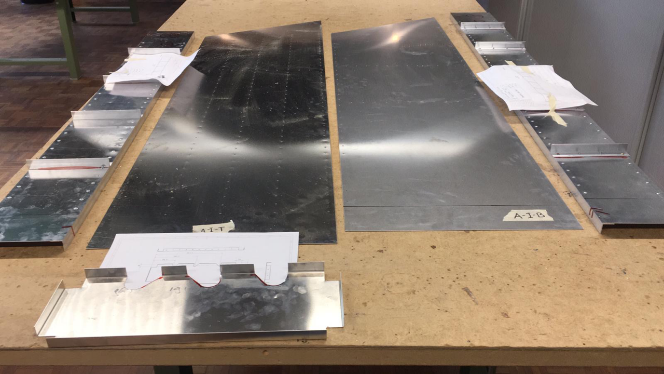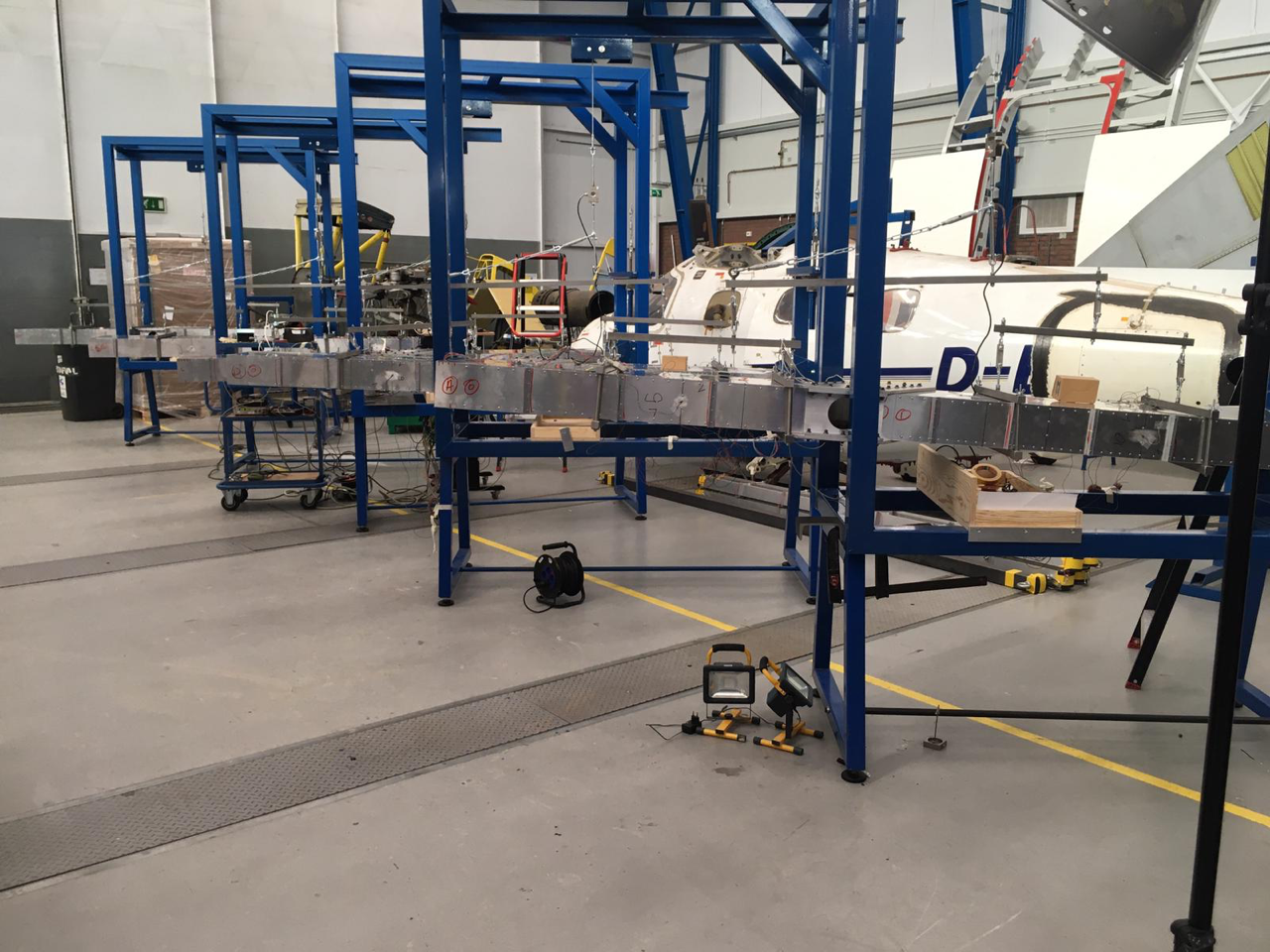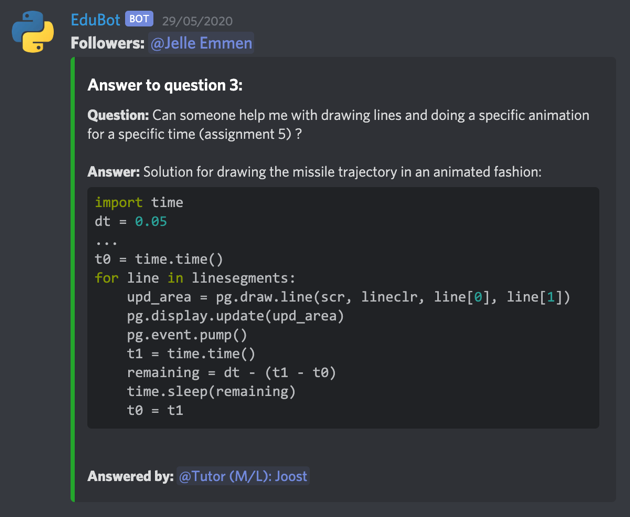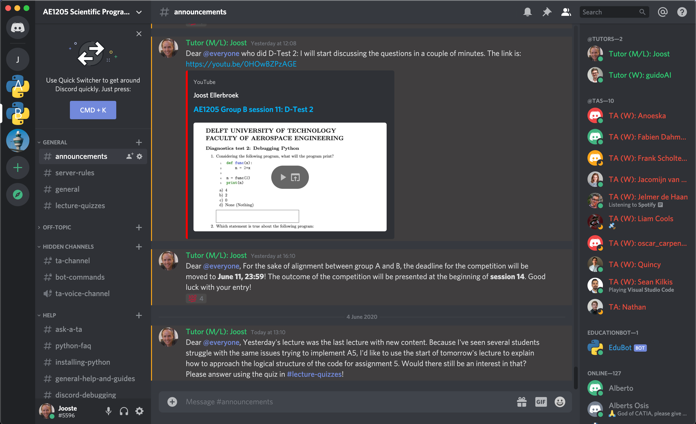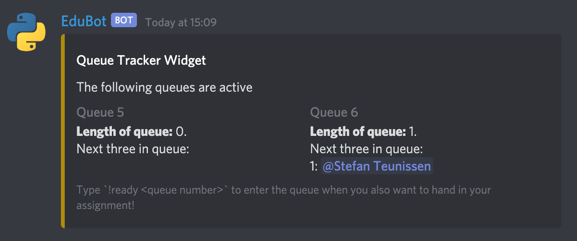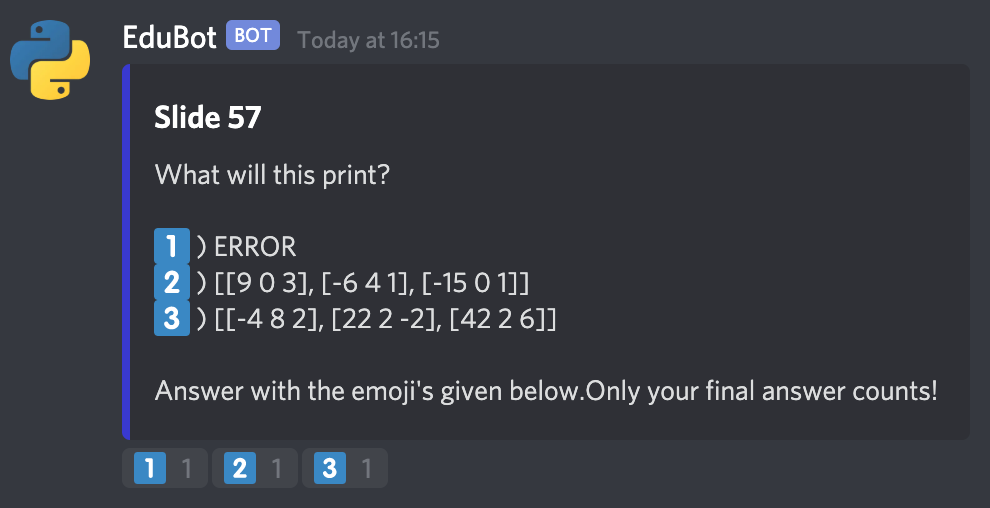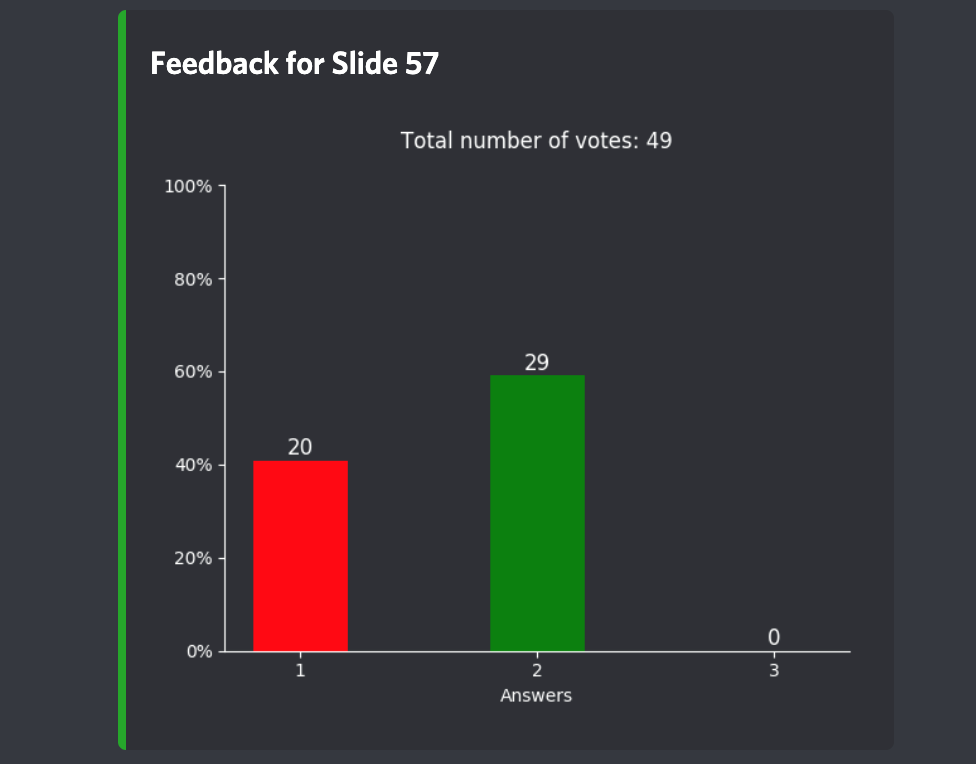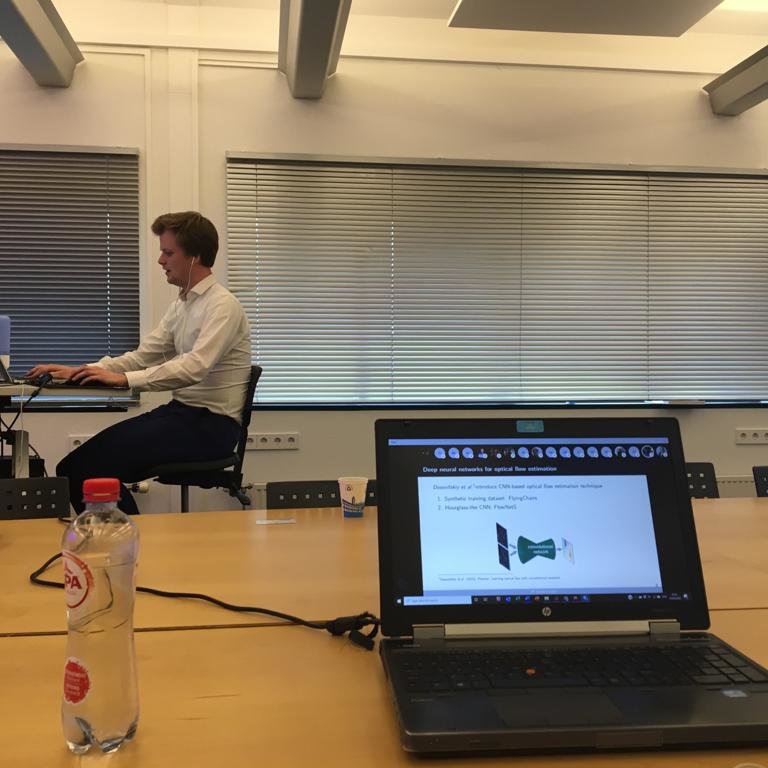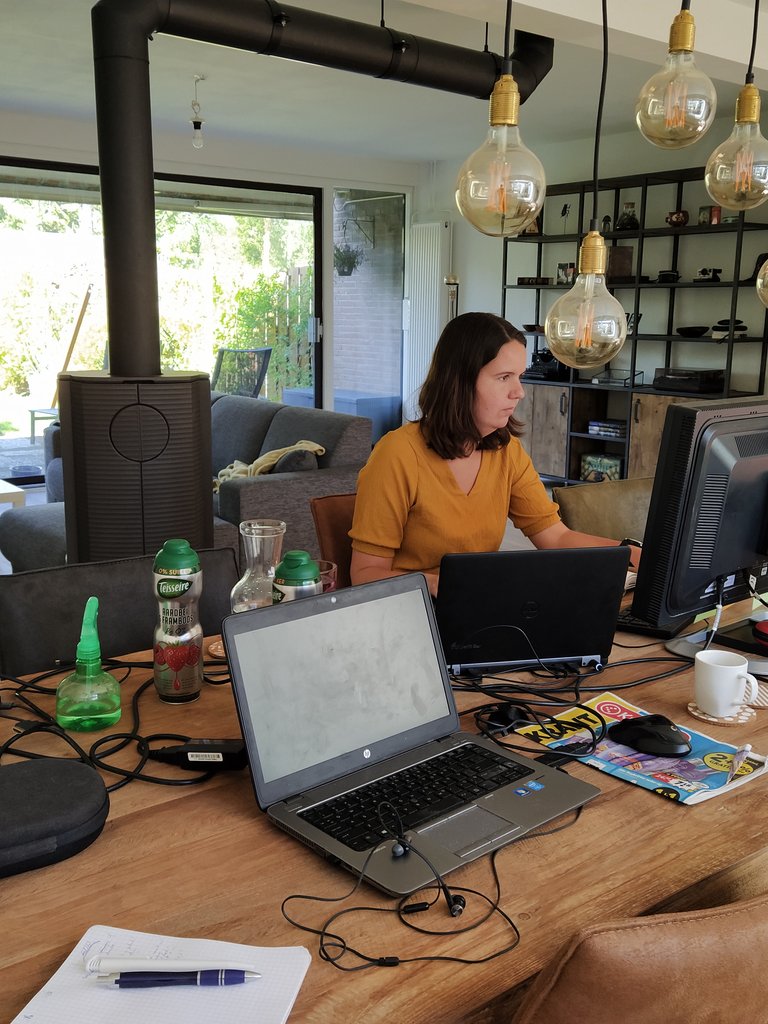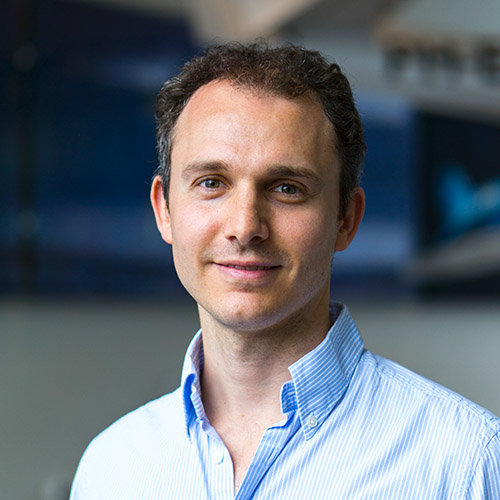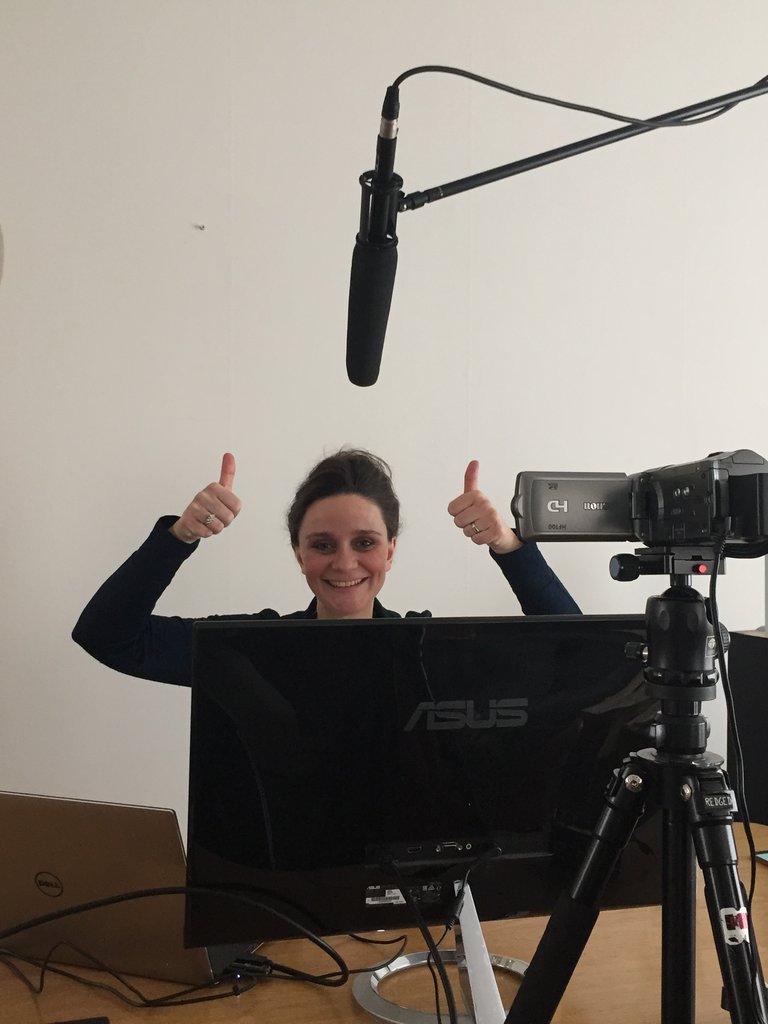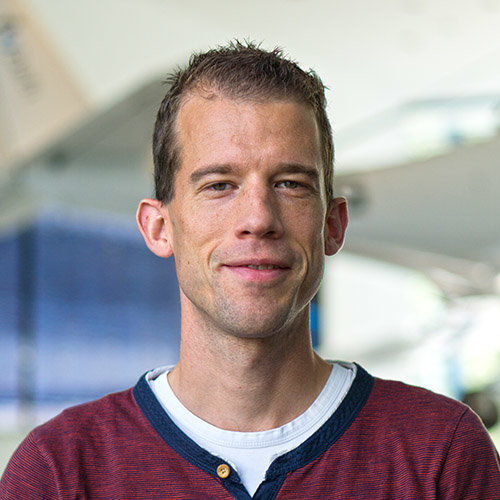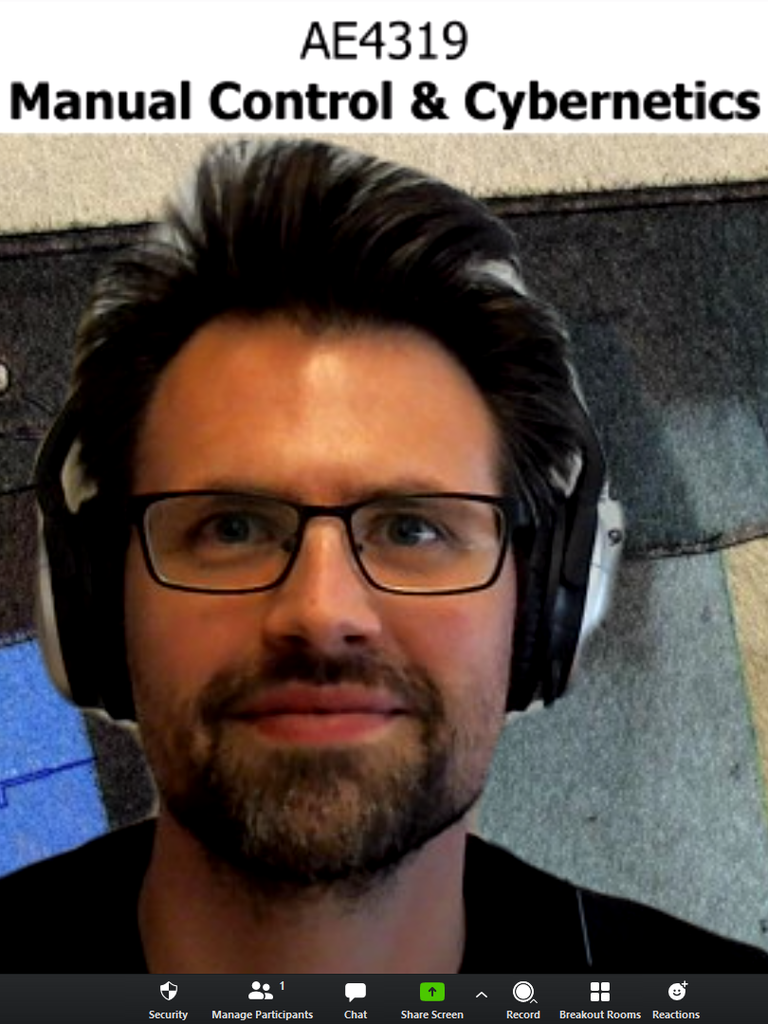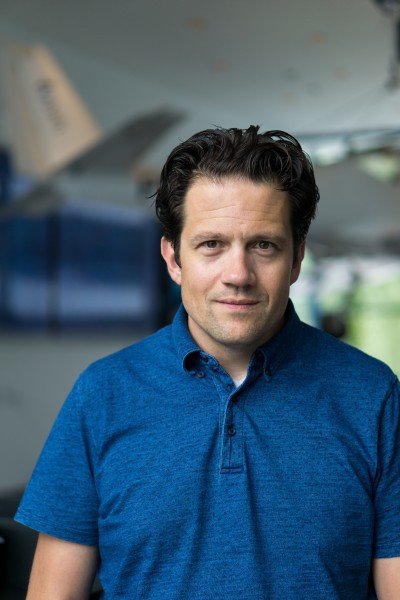
Paul Roling
On 11 and 12 January 2021, first-year bachelor students demonstrated the self-designed and built aeroplane wings they made for the course 'Exploring Aerospace Engineering'. This year - because of the strict lockdown - they were forced to do this with a small group of representatives in an immense sports hall at X. Paul Roling is the lecturer.
What do students learn at Exploring Aerospace?
"Academically, the project is not very demanding. It is mainly an introduction to each other, the faculty and project education. The assignment is: design a flying wing for a mission to Mars. They design the mission on a poster - actually sending a wing to Mars is too expensive - but they actually design, build and test the flying wing. To do this, they perform various wind tunnel tests, including with aircraft profiles and propellers in the W-tunnel and measurements and demonstrations on a complete wing in the Open Jet Facility. At the end of the first quarter, the students design the wings, which are then cut from a block of EPP (foam material) by the mentors using a computer-controlled thread-cutting machine. In the last weeks before Christmas, the students then assemble their wings to test them in a sports hall after the Christmas holidays."
How many students are taking part?
"All first-year students take part: about 440."
What does the course normally look like?
"All lectures and project sessions are normally held on campus. The students first test constructions and materials in the aircraft hall, and then they start the project itself. In Q1 there are two project sessions per week, in Q2 one session per week."
Is this the first time you have taught the course since the corona pandemic?
"It runs from September to January, so yes."
What adjustments did you have to make?
"In the beginning, there was quite a lot of consultation needed regarding the roster, as I wanted to spread the students around the week as much as possible. This caused some discussions with other lecturers who wanted to organise their lectures in a single live stream. There was also some discussion about whether it could be done on campus, but the university Executive Board came to a decision fairly quickly that first-year students in particular should be given a chance to work on campus. Eventually, I decided on one session on campus per week starting in week 2, starting with a team building exercise, and three sessions online in weeks 5 to 7 of Q1. Actually, they were supposed to start in week 1 with structures and materials tests in the aircraft hall, but that turned out to be not feasible with the Covid-19 rules. This was eventually done later via videos.
For the subject Engineering Drawing, which falls within the same module, there was then the option to work once a week in the Fellowship. Also, for both Engineering Drawing and Exploring Aerospace Engineering, the students were allowed to stay in the Fellowship for the rest of the day that they were allowed to be on campus to follow online lectures, as they would otherwise miss them due to travel time. If they really didn't want to or couldn't come, they could also participate in the project from home, but we saw that this was less effective.
We also organised the wind tunnel measurements differently: a small number of students did the measurements in the wind tunnels and the rest watched via a live stream. We shortened the demonstration in the OJF so that the entire project group of 10-11 students could attend live. For those students who really could not attend, we had a livestream for this session as well.
What did you have to arrange yourself?
"I adjusted the computers and other equipment for the livestreams myself during the summer holidays. For the live stream from sports centre X, for example, I needed video capture cards and a graphics card. These modified computers also come in handy for other lectures, they are now used in halls E to H where lecturers can live stream their lectures.
In addition, Sander Barendrecht arranged for the furniture in the Fellowship to be replaced in Q2, because we noticed that some rooms in the Fellowship were sometimes too crowded and students sat too close together. With the new furniture, this is almost impossible.
Unfortunately, there were four students with a Corona infection in the week after the first exam period, but as far as I know nobody in the Fellowship was infected during the project. So the measures seem to have worked."
Did you have to make any further adjustments to the course when the lockdown went into effect in December?
"I was very happy when Mark Rutte announced that there was an exception for practical education. At that time, six of the ten groups had their wings ready and four did not. The faculty corona team also quickly gave the go-ahead for the students to continue building. Otherwise, I would have had a problem with the flight test in X.
Groups that only had to make the posters or do Engineering Drawing were encouraged to work from home."
How do you do it: being able to react or anticipate the scaling up and down of measures?
"For me, it was important from the start to be able to scale up or down, so that the project could continue regardless. In the worst case scenario, the student assistants would have had to do the tests and build the wings with all the students online via a livestream. Fortunately, that was not necessary."
Do you think that this hybrid form of teaching affects the quality of education?
"You notice that students online have more problems with motivation and concentration. They also miss the social interaction and the regularity. I did notice that the live streams really have an added value. Now everyone could listen in and if they followed the whole livestream of the flying tests, they can now know much more about the stability of the flying wings."
For example, what do students not learn in this setup that is really needed?
"I don't think it made much difference to this project in the end. But it was always much quieter in the Fellowship and they won't be so used to the hustle and bustle around them anymore. I'm more worried about what the lack of social life, like get-togethers and Christmas dinners, will do to them in the long run."
And vice versa: what do they learn now that you would like to keep after the pandemic?
"Of course, how to collaborate online. They will also be much more skilful in working with digital tools, because you can share them much more easily. For example, I've been trying to promote the use of formula editors, like Mathtype, and drawing programmes for years."
Have you learned anything yourself in the past period that you would like to share with your colleagues at the faculty?
"That it is especially incredibly important to keep communicating with your colleagues. I was in contact several times a week with George Wijnschenk, who, in addition to Engineering Drawing, also kept an eye on the progress of the wing project in The Fellowship. I also had a lot of contact with Sander Barendrecht about the state of affairs. In addition, every week in Q1 and every other week in Q2, I had a team meeting with my 20 student assistants and the academic counsellors, who also had to deal with a complex and sometimes uncertain situation.
In any case, this year I asked a lot more of the student assistants and they helped with things like soldering connectors to the engines and making instructional videos, in addition to organising social online activities, a task that was part of their role as mentors."
How are you doing?
"In a way I am fine. However, I couldn't sleep well during the Christmas holidays, probably because I suddenly found myself in a situation where I could do almost nothing and had to start taking up hobbies again.
In addition to this project, in Q1 and Q2 I am also teaching a C&O master's course "Operations Optimisation" and coordinating a lecture in the Airport of the Future minor. In Q3, I teach airport operations to the MSc students, flight mechanics to the second-year students and (hopefully) coordinate the third-year flight test again. Q4 is then fairly limited in terms of teaching with only the tutoring of a Design Synthesis assignment. At the moment, I am also supervising about 12 students with their thesis and I am involved in two EU projects. Fortunately, I already organised my exams via Mobius, so it was an easy switch to online.
I was also re-elected to the works council in November, where I am, among other things, the chairman of the real estate committee. Actually, I doubted whether I had the time for it and I was deliberately low on the list, but thanks to 69 preferential votes from the LR in particular, I am back and will do my best again.
I am also married and have a 4.5 year old son, who fortunately can go to the childcare centre two days a week.
What are you looking forward to when the pandemic is over?
"Attending the AIAA Aviation conference in the US (online conferences are no fun) and watching a Formula 1 race live again. But a CPC run or a Dam to Dam run would also be nice."
Read an article about Paul’s course and watch the recording of the flying wing tests: www.delta.tudelft.nl/article/propellers-propylene-and-propulsion
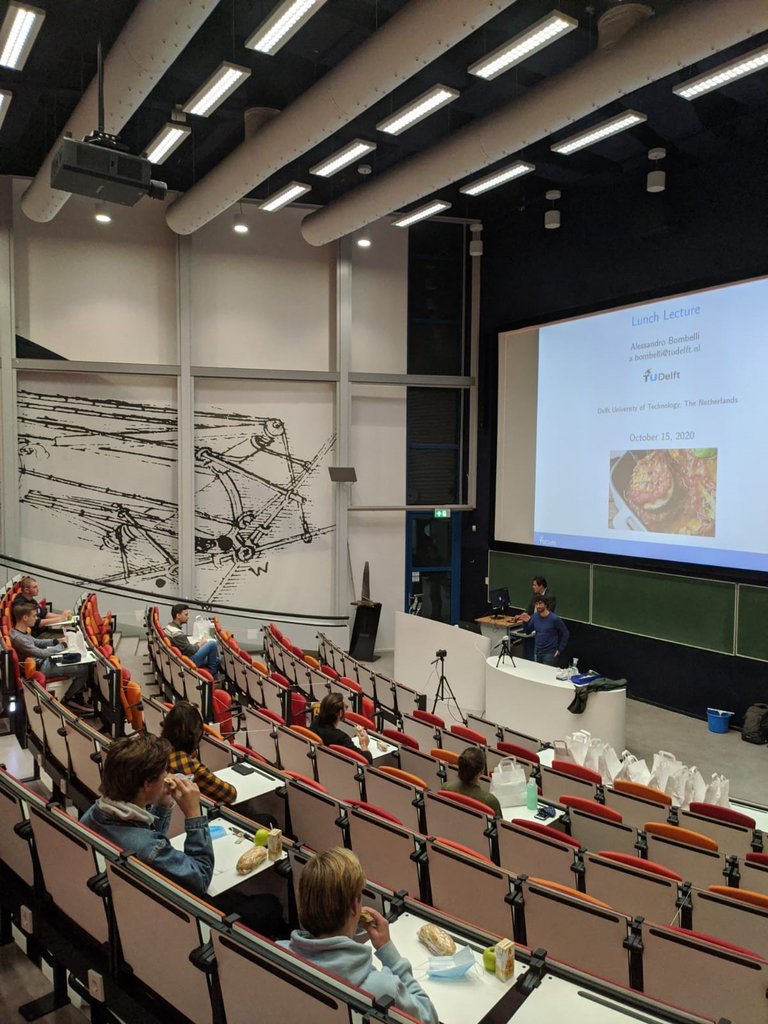
Natalia Elías Ortega , C&O MSc student
How do they do it? C&O's example of the on-campus days
With the academic year starting in an online-format, the on-campus days allow first year Master students to get familiarised with the faculty, teachers and colleagues, while maintaining social distancing rules. The on-campus days are voluntary and every activity is also fully offered online (streamed and recorded) for students that are not able to attend in person.
In the C&O department, activities are organised every week with the help of the track and profile coordinators, mentors from STATO and STABILO study associations and the C&O online learning teaching assistant. The students are able to study at the faculty every Thursday from 10:00 until 16:00 in assigned lecture rooms, supervised by TAs. During this time-slot, one activity is organised every week: lunch lecture given by faculty staff or companies, Q&A session, facility tour and a mini-symposium are examples of activities that have been planned so far. For these organised activities, lunch is provided and subscription lists are arranged in order to ensure the maximum number of students is able to attend, while complying with regulations. Students like the format of the C&O on campus days.
“I attend the C&O on-campus day because of the much more flexible interactions you can have with your teachers and fellow students. The on-campus lectures and activities are of course different than in pre-corona times, but it still allows you to go back to a more human atmosphere, where you can ask questions spontaneously, get a coffee or make a joke with the person sitting next to you.” – C&O MSc student
Natalia Elías Ortega
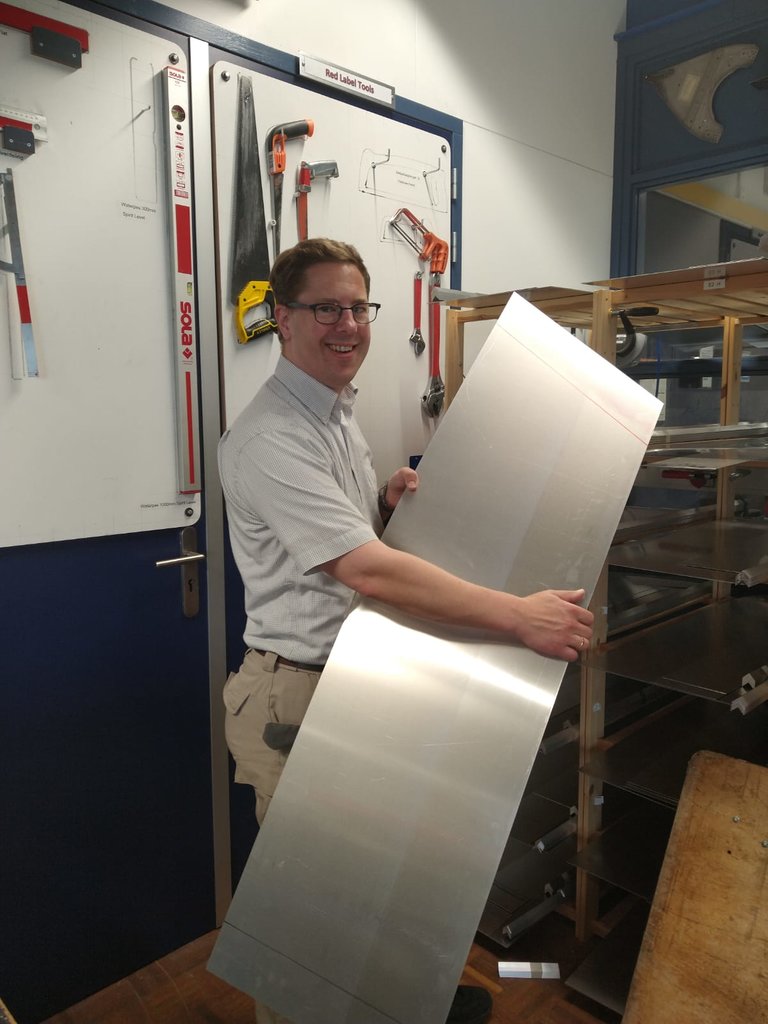
Michiel Schuurman, Assistent Professor, SIC-ASM
One of the subjects you give (with George Wijnschenk-Dom) in Q3 and Q4 is AE1222- I Design and Construction. How do you normally teach this course?
AE122 is a compulsory course for first year BSc students in the second semester. Normally, the course consists of 28 four-hour project sessions given in the Fellowship (work session) and sometimes in the Aircraft Hall (practical session). The course usually has about 420 active students divided over 40 groups. In each session 20 student assistants (TA's) are present to help the students answer questions and to guide the design process. In Q3 it concerns the design of a Rocker Boogie of a moon rover and a compression panel of a rocket. In Q4 they make an aircraft wing that consists of two 'wingboxes'.
How do you teach this course in Corona times?
We had to put the project sessions online because the Fellowship closed. Unfortunately this happened in the middle of Q3. So we had to switch from one week to the next. The 420 students and 20 TA's suddenly had to do everything online. To facilitate this switch we let the students and TA's choose what would work best for them and their group. The solutions they came up with included Zoom and Skype, but also the online gaming platform Discord. Discord met certain needs, but I am actually quite happy we will not continue to work with it. One of the disadvantages for example is that you can’t know whether the logged in students are actually paying attention or whether they’re just playing a game of 'Call of Duty'.
However, it did not stop there: an essential part of the project is building and testing a compression panel and a 'wingbox'. Although the students had built 80 compression panels just before the Corona closure, testing was no longer possible. I had to do the tests with a small team, without the students, that was a real pity. We recorded the test on video and sent it together with the test data to the students. They could then write the project report.
In Q4 the challenge was even bigger. After all, we didn't have 40 'wingboxes' built by students. When the Corona rules were further tightened, I was about to take the material home to build the 'wingboxes' myself in my garden shed. I had already cleared the shed and prepared the drills and band saw. But my wife was less enthusiastic because of the noise I would make all day. Together with the technicians we came up with a more practical solution. We rewrote the assignment so that the students could drill their 'wingbox' digitally from home using the KUKA manufacturing robot in the aircraft hall. This suddenly made it much less time-consuming for us and made assembling the 'wingbox' much easier.
But also during this process we had plenty of challenges. You can picture a real factory where everyone was working at the same time: the robot was drilling, we had contact via Skype and What's App with two TA's in the Netherlands and Poland who made the latest designs and sent the drawings and the 'wingbox parts' were produced. And all this during the virtual project sessions of the students.
I am glad that everything worked out and that we were able to deliver essential input to the 1st first students in time. I don't think they are aware of how much work the technicians, TA’s and I have had to put in.
Is there a difference between teaching a course online and offering project education online?
I can only answer this question for the course and project education I teach. In Q4 I teach the AE4ASM513 Forensic Engineering course together with Calvin Rans. For this specific course the online changeover was relatively easy, because we already had some lecture material online. The online conversion was quickly done, flipping slides to videos and teaching online. The exam "Crash Day" which we normally do outside with an airplane wreck the students have to investigate, was done digitally this time. During the exam the students visited a digital accident via Brightspace.
For the project education I teach in Q3 and Q4 this was more complex and time consuming. To reach the same learning goals, you really have to look for other solutions with which groups can work together and with which everyone can participate in an interesting (digital) assignment. I couldn't do this from home. In order for the project to continue, I had to be at the faculty to build and test. The students really needed this data and information for the project. Luckily there were technicians who helped (at the appropriate distance). Without the technicians, George and the TA's I would not have been able to do this.
How are you doing?
Reasonable. My previous job was very demanding as well. I was used to it. But 15 weeks (Q3 and Q4) of project teaching and especially the pressure because the students depend on you for their dates and guidance, did cause me some stress and sleepless nights. In July and August I will take it easy for a while.
What are you looking forward to once this pandemic is over?
A holiday and freedom of choice. Unfortunately I couldn't go on holiday to Rome with my wife during the white week in Q3. So this is still on the travel agenda just like some other destinations like the Maldives and Norway.
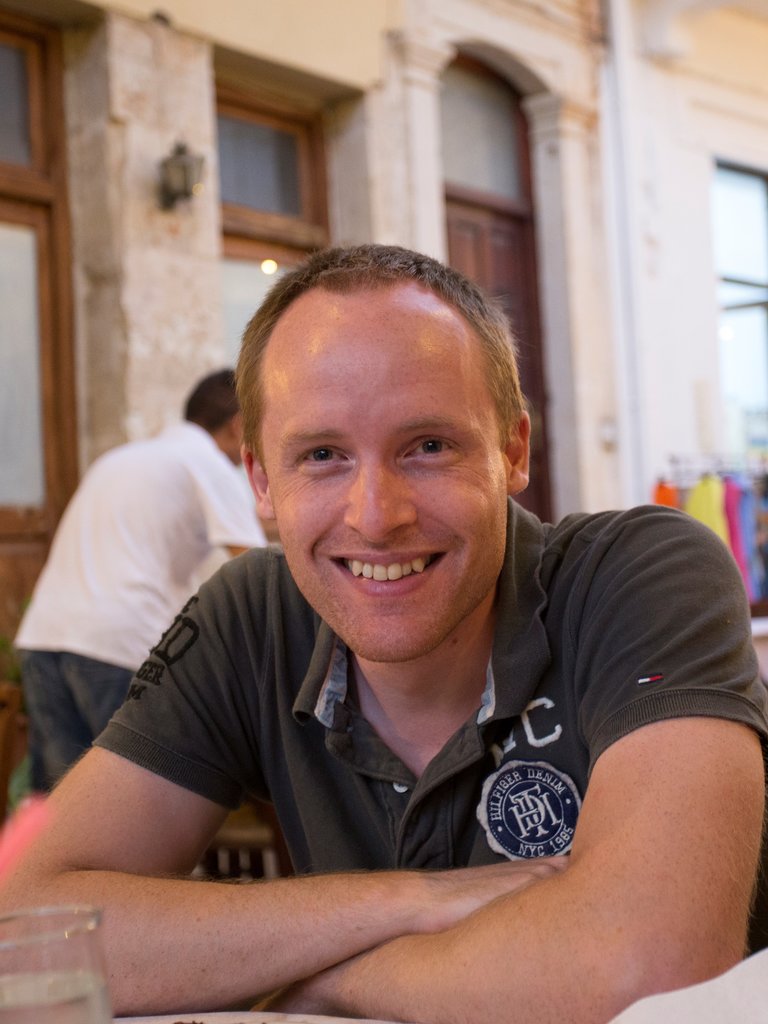
Joost Ellerbroek, Assistent Professor, CNS/ATM, Control & Simulation
One of the courses you teach (with Guido de Croon) in Q4 is the AE1205 – Programming and Scientific Computing in Python. How do you normally teach this subject?
The AE1205 is a large, interactive, compulsory Bachelor course for first year students. Normally, it consists of 14 four-hour interactive sessions, held in two Studio Classrooms, linked via a video connection. The course typically has around 450-500 active students, who are divided over two groups; each with their own schedule and taught by their own tutor. In every session, there are 8 student-assistants (TAs) present to help students with their exercises and assignments, and to assist in the assessment of handed-in assignments (which students can hand in to earn 0.5 bonus point for the exam).
The general approach to these interactive sessions is as follows:
- The session starts with a lecture part (± 1 hour), introducing new lecture material, and/or reiterating topics, and discussing parts of exercises and assignments that students are having trouble with.
- The lecture is followed by an interactive session, where students can work (a.o.) on exercises (for practice), and assignments (for 0.5 bonus point). During this time, the tutor and TAs walk around to help students with their work, and take in assignment hand-ins which are manually checked (students have to show that they understand their own code).
- Occasionally there is an extra lecture part, either with an interactive quiz to test the students’ knowledge on a topic, or to discuss topics that many students are struggling with in the exercises and assignments.
The python course is seen as an intensive course by the students, but is appreciated a lot by most students, especially because of the interactive elements, the amount of support from tutors and TAs, and the care that goes into the design of each year’s exercises and assignments.
How is the subject taught in Corona times?
We’ve taken the course entirely online. After the Corona restrictions came into effect in March, it quickly became clear that the tools that the university has made available for teaching a live course on-line would not suffice for a course as big as AE1205. With over 600 enrolled students (of which 500 actively participating), neither Bongo YouSeeU nor Cisco WebEx has the capacity to stream live lectures to all participating students. In addition, none of the available tools could provide the level of interaction that made the Python course so successful in its normal set-up. Our solution, instead, was to use a combination of YouTube live streaming for the lectures, and Discord (a social gaming platform) for the interactive part of the course.
The benefit of YouTube as a streaming platform for lectures is clear. A live lecture is scheduled in a wink, and powerful streaming software such as OBS can be used to set up a flexible arrangement of audio, video, and desktop sharing. The number of concurrent viewers easily scales up to well beyond what is necessary for our purpose, and once finished, the lectures are immediately available for viewing (again) later.
Discord is a tool that is gaining popularity as a platform for on-line education. Its original purpose was to provide an IRC-like platform (with text-based communication in multiple topic channels) combined with Voice-over-IP functionality to gaming communities, to help on-line gamers find each other and communicate. Nowadays, Discord is also used more and more in business and education applications. In addition to voice and text, Discord also allows video communication and live desktop sharing, and it provides programming API’s in several languages that allow you to make automated ‘bot’ users that can perform various tasks on your Discord server.
For the on-line version of the Python course, we set up two Discord servers, one for each student group. The servers have several categories of channels, such as general announcements, off-topic discussions, help, and per-lecture-topic discussion channels. To make it easier to deal with such a large number of students with questions, discussions, and assignment hand-ins, we also created a bot, featuring automated hand-in queues, question queues, and lecture quizzes.
The AE1205 course has a total of six assignments distributed over the sessions, and a bonus point can be earned when those assignments are successfully completed. To avoid plagiarism, students have to hand in their assignment in person, and explain a part of their code to a TA or the tutor. In a dedicated ‘hand-in’ channel, the students can queue up with the bot. The bot can automatically invite students from this queue to a ‘voice lounge’ where the student is interviewed by a TA or tutor. We’ve seen these queues grow to up to almost 150 simultaneously waiting students, so this piece of automation definitely made the difference!
When students have issues with an exercise or assignment, as a first step, they are encouraged to discuss their problems with their peers, in one of the themed topic channels. When students do need help from a TA or tutor, they can post their question with the bot in a dedicated channel. Once posted, all interested students can follow this question, and will be notified when an answer is given. TAs and tutors can answer using a combination of voice chat, inviting students following that question into a voice lounge, and by text, resulting in something similar to the example on the right. Answered questions remain visible in the channel so that students can look back into previous questions and their answers. One of the nice things is that students can also answer these questions themselves, which we’ve seen happening more and more as the course progressed.
Finally, the bot can also be used during the live lectures to provide interactive quizzes, with graphs visualising the outcome.
All of this helped us change what would probably have been a 7-week-long headache, into a smoothly-running course, with students even recommending teachers from different courses to ‘have a look at how they do things at the Python course.’ At the end of the course, we now have several excellent additions that I would seriously consider using again next year, when hopefully we will be able to lecture face-to-face again, at the university.
How are you doing?
Good, if a bit busy. It would be nice to be able to talk with colleagues face to face again, but otherwise I must say that working from home is going way better than expected!
What are you looking forward to once this pandemic is over?
Going abroad! I love hiking in the Austrian Alps, but I don’t see that happening this summer.
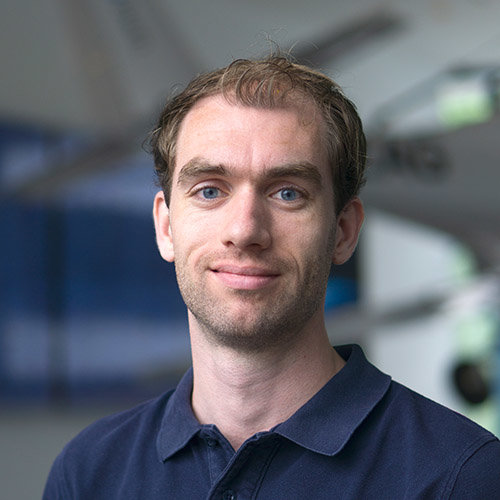
Tomas Sinnige, Assistant Professor, Flight Performance and Propulsion
What subjects do you teach in Q4?
Due to the corona situation, the Q3 course AE4115 Experimental Simulations continued into Q4 for a number of weeks. AE4135 Rotor wake aerodynamics runs this whole quarter.
What other jobs are on your to-do list during this period? Is it true that you will be participating in an online conference soon? Tell me more.
The experimental research in the wind tunnels continues, so I'm still at the lab now and then, contributing to colleagues' experiments. I also call a lot via skype to supervise my graduate students in the best possible way, and I've also participated in some graduation committees. Submitting research proposals also continues. I’ve just made the deadlines for 2 research proposals.
We are also setting up a website to share our research data in the field of propeller integration (ae.tudelft.nl/propellerdata). The idea is to share our experimental and numerical data with the growing community that is doing research on propellers and rotors in general. We have been working on this for much longer, and during that time we have built up a nice set of data, so it would be nice to make it available to others for validation purposes. This has been on the to-do list for much longer, but I hadn't started it before. Because of the good help of colleagues it is now going much faster than I thought!
I will participate in the online AIAA AVIATION conference (15-19 June). This conference will take place online for the first time, so that requires some adjustments compared to the normal format. For example, the presentation needs to be submitted in advance with recorded voice-over to support the slides. Fortunately, I was already working on this for AE4135, and was able to learn from Carlos Ferreira who has been doing this for a long time.
What would your fourth quarter have looked like normally?
Many of the activities have continued as usual, but of course in a different way.
Graduation sessions with a room full of the candidate's family and friends are a lot nicer way to finish a tough study than a session at the faculty without an audience, or even a defence completely via skype.
Furthermore, the AIAA AVIATION conference has turned into an online event, so the planned trip to the US is cancelled.
We are also just hiring 3 new PhD candidates, one of which has already started online. It would be nice to welcome them in person and to be able to introduce them to their new colleagues right away.
Finally, I also had a number of appointments for visits to TU Braunschweig in connection with participation in their SE2A project, but that will also be done online for the time being.
What did you have to do to offer your courses online?
For AE4115, the lab exercise was running just when the measures started, so we had to cancel it. The students had to use last year’s data, and Georg Eitelberg and I had to change the course a bit.
AE4135 was already fully available online, so that didn't require a lot of major changes. Carlos is continuously working on improvements, I made and recorded a new module on propeller aerodynamics for this year.
How are you going to prepare for the conference?
The AIAA AVIATION conference has turned into an online event; I am curious what that will be like. I think AIAA doesn't quite know yet... Of course it certainly has advantages to avoid long journeys and to make the conference more accessible for organisations that may not have the means to finance such activities. Since the question & answer sessions are still live on American time, it will make little difference in terms of jet lag...
Was switching to online education and collaboration difficult? And why (not)?
For AE4115, switching had to be done quickly. We did our best to make the adjustments as fair as possible without compromising the quality of the course. This did require some adjustments to the set-up of the layout of the course for this year. In the end, the students didn't seem entirely satisfied with this, so we are now evaluating it.
Furthermore, all online tools appear to work well, so that makes the remote communication actually run smoothly. We also organise online Friday afternoon drinks amongst colleagues once in a while, so the mood remains good.
Have you asked someone for help/advice? Did that help?
Everything went well in consultation with colleagues involved, so I am very satisfied with that. Furthermore, I notice that everyone is taking up the new situation well and flexibly, and we are managing just fine.
How are you doing?
Everything is going well. Normally I would be ready for a holiday, but given the current situation I'm postponing that for a while.
What are you looking forward to when this nightmare is over?
It would be nice to have personal contact with students and colleagues again, that works a lot better. And apart from work: a nice holiday!
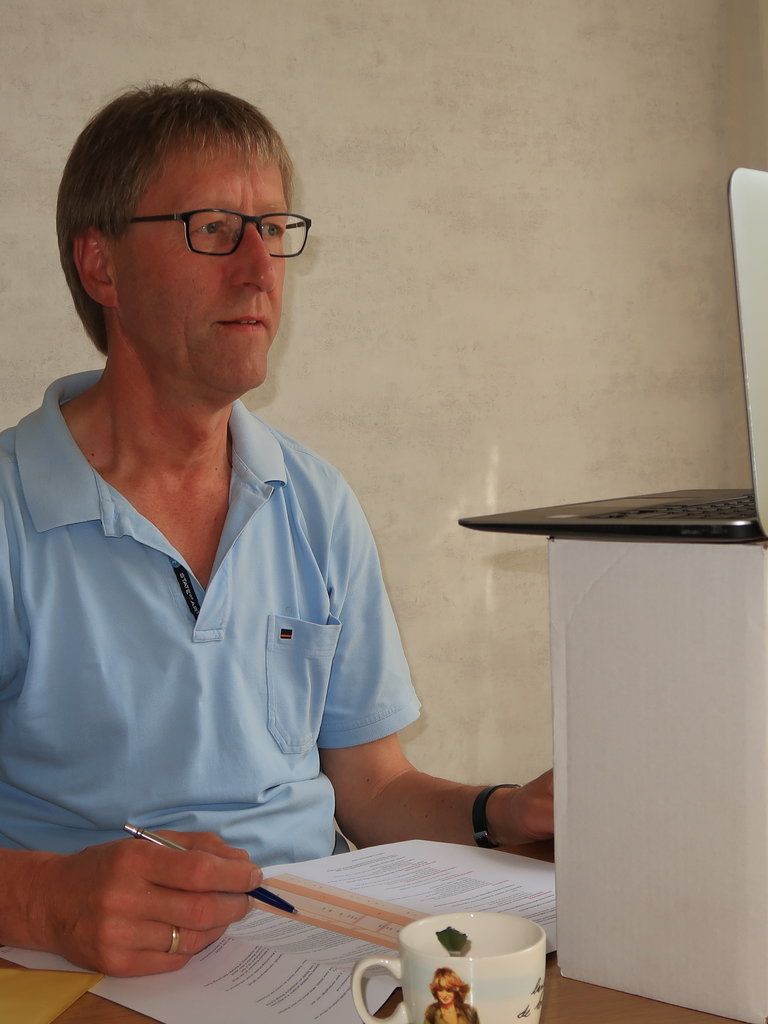
Aldert Kamp, Director of Education
You're about to say goodbye to the faculty. How long have you been director of education at Aerospace Engineering?
I became Bachelor Programme Director in 2005 and Director of Education for two days a week in 2007.
What would you normally have done in your final months in this job?
I had set out to say goodbye gradually, thoroughly onboarding my successor and take a farewell tour of some ten universities that are part of the international networks where I am active. I had a series of invitations to give workshops and lectures on my vision of future engineering education.
What have these months looked like in reality?
For the past 11 weeks, I've been working, like almost everyone else, from home. Especially the second half of March and the beginning of April I have experienced as a roller coaster ride. In a short period of time an awful lot had to be arranged, at university and faculty level. Days in a row I had five to seven hours of Skyping and Zooming with various parties. I found that very tiring. But it also gave me a kick to join forces with all those parties in order to be able to provide clarity to lecturers and students as quickly as possible.
How have you experienced the transition from campus to online education at the faculty?
It's a monster job and I have enormous appreciation and admiration for the staff who were able to make adjustments this quickly and this well, in March, April and May, and continuing into the next academic year. It's great to see that there's so much resilience in the faculty. But let's make sure that everyone has a chance to recharge their batteries in the summer.
What's going well?
From the students I receive a lot of positive feedback and great appreciation for the work of the lecturers, the Examination Board, and our support staff at Education & Student Affairs. In the recent meetings of the B-committees surprisingly few problems were signalled, especially when considering this transition was such a monster job that had to be done in so little time. Some lecturers have become so enthusiastic about remote teaching that they want to continue using that form even after corona. The fact that the Design Synthesis Exercise was transformed into a remote version in no time is also unprecedented. I mainly hear positive reactions about this from staff and students.
And what isn't?
I prefer to formulate it as "what can we do better?” At AE we tend to set the bar high. We know of some lecturers who have been somewhat overconfident, giving students too much work or not coordinating well with other lecturers. Also, the variety in online test packages is not ideal for students. We are working hard to improve this for Q4.
And then there are things that don't necessarily go well or badly, but that do give cause for concern about how to proceed. I'm thinking of changes in the bachelor's to embed ethics and sustainability and the master vitalisation. These activities are currently on hold and we will want to give them momentum again. And what to do with students who had planned to go on exchange or do an internship?
One of your points of view is that the engineer of the future must be able to work very well together in teams. What message do you want to give to all those students who now have to learn that during social distancing? For example in the DSE or because they are doing an internship at a distance.
Winston Churchill said at the time "Never waste a good crisis", and I would like to give that message to our students too. After all, since they were born, large parts of their social lives have taken place online on social media. To the students I would say: Think about what it means to you that your whole life, study and spare time, now takes place online only. Is this your future, or do you also see value in being together physically on campus, and later in a company, and what is that value to you? But also, how did it make you feel, from one day to the next, you were no longer welcome on campus and education was done remotely? Could you switch quickly enough between the new ways of working, and working with different tools? Resilience is an important competence for the rest of your life, and this is a definite moment to find out if you are sufficiently skilled in it. In other words: what do you learn about your personal skills from this crisis?
Do you think that our learning process in corona time will lead to structural changes in the way we teach?
I think that will depend on how long this pandemic will last. If we go back to "normal" during or immediately after the first semester, I expect that the effect will be a ripple in time, and most teaching will return to its original form. If this lasts a year or longer, I do expect lasting effects. A weakening of the international culture, a strong reduction of hands-on education and its replacement by, for example, virtual reality. In such a case, you can expect the student population and their motivation to change.
After all, theoretical knowledge is abundantly available through online (including corporate) universities. If students have to miss out on the community with life on campus, does a university education still have sufficient added value? The current generation of students might then opt for a completely different concept of education instead of a rigid and linear academic study.
What did you learn about online collaboration during this period?
The online tools are of course fantastic. They enable us to coordinate business and make decisions. But they lack almost any form of empathy and therefore can't match ordinary human contact. Over the past few months I have seen my vision confirmed that you can't train good engineers with just remote education. Many don't think about it, but engineering is a very social activity and in the future of artificial intelligence and robotization, the importance of the human side in engineering will only increase.
I also notice that the online way of working together is paralysing the development of vision or renewal strategies. To do that, you really need to be able to look each other in the eye. Thinking about the future has been put on the back burner both at the university, faculty and in my external networks.
How are you doing?
I am happy that my family members and I are healthy, and that everyone still has his or her job. I notice that working from home, not being in each other’s presence, the routine of skype and zoom meetings and the ever-filling mailbox are taking their toll. You have to make and guard the rhythm of your working day again, detach yourself from your screen and take a brisk walk or bike ride outside.
Only now it strikes me how important the 1-hour commute is to me. I miss the daily car ride in which I am apparently very active thinking about the bigger perspective and the more future-oriented education topics. Until a few months ago, I was actually working on these issues on a daily basis.
When and how do you say goodbye?
The only thing that is clear: 11 July is my last official working day. My farewell party was scheduled for mid-June but we have had to postpone it. I will, however, come back to the faculty for a real party when we can get back together. I am really looking forward to a festive closure of 18 years of TU Delft once the world has gone back to normal.
What are you looking forward to when this nightmare is over?
To go on enjoying life. To be able to walk around, visit and travel carefree again. I also like to pick up my normal rhythm again with swimming and volleyball, not to mention my painting hobby. I would also like to spread my vision of the future of higher technical education. How soon this will be depends on when the corona storm is over.
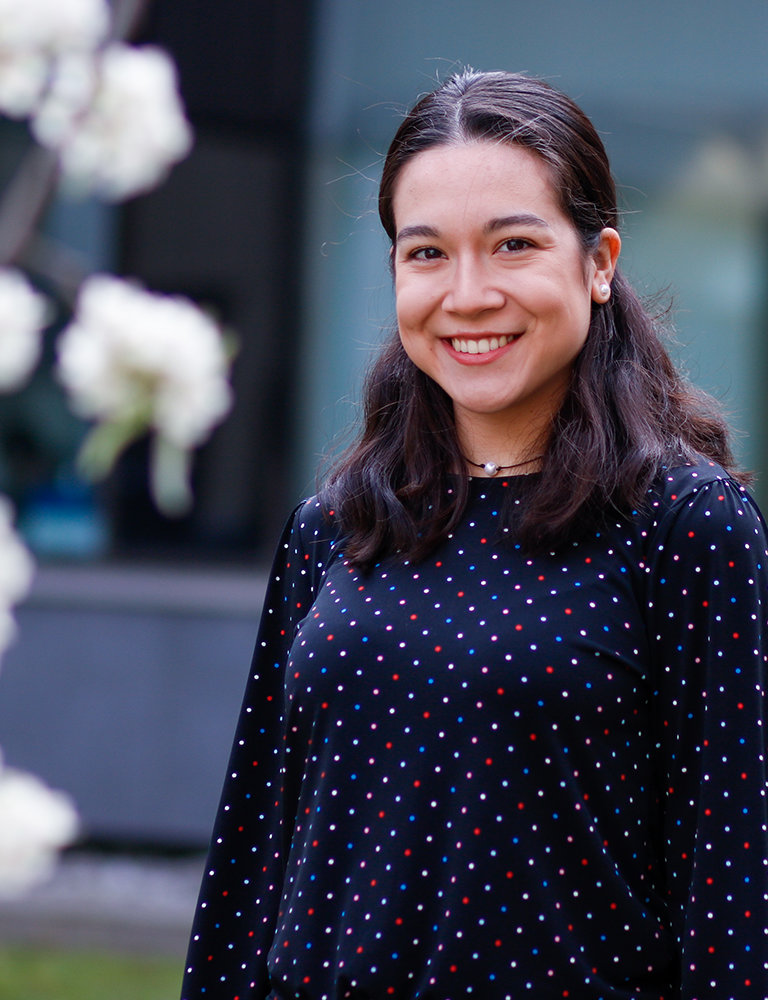
Jillian Oduber, BSc student currently doing her Design Synthesis Exersize
You’ve recently started your DSE. What is the topic of your group?
Our topic is “Small satellites for gravitational wave observation”. Our group has to develope a space mission consisting of a constellation of at least 3 CubeSats that are equipped to measure gravitational waves. It’s quite an interesting topic to work on, since missions like this one are not flying yet.
Of how many students does your group consist?
Our group has eleven members. That sounds like quite a lot, but there is definitely enough work for everyone!
What would these weeks have looked like normally?
Under normal circumstances we would have spent 10 weeks sitting in the Fellowship fulltime, along with all the other DSE groups. In between we would have had to give our midterm presentation and at the end we would have had to present our final design to an audience and a jury during the DSE symposium. Now, all of that has to happen online.
How do you do your work now? Which tools and programmes do you use?
Our group mostly uses Zoom to video call when we work together, and also when we have meetings with our tutors or the teaching assistants. We start the day at 9:00 in Zoom with our whole group to discuss what has to be done that day. Then we usually split into smaller groups to work on specific tasks, and we use the “break-out” rooms in Zoom for this. We also have group meetings after lunch and at the end of the day to catch up again with what everyone has been working on. We also use Discord to chat, keep track of our schedule, and share files. We use Google Drive to store even more files and work together in Docs or Sheets. When we need to make diagrams, we use Draw.io. Everything we’ve worked on comes together in our reports, which we compile in Overleaf.
The DSE is also meant to teach you to work together. What are the main differences between working together in an office and online collaboration?
The communication! It’s just so different compared to “real life”. It is harder to pick up on the “non-verbal” communication, which can actually be quite important in making sure everyone is on the same page. For example, we’ve now agreed to always verbally state “yes” when we agree with something rather than just nodding. Sometimes the online meetings can be a good thing, since only one person can talk at a time, so they do have everyone’s attention. On the other hand, it can be tricky to find the right moment to interrupt the conversation to say something or get your point across. Our group has a system now where we actually physically raise our hands if we would like to say something during a discussion. We also address what is working and what is not working for us, so that we can continuously improve our communication.
What is just impossible when you work together online?
To work more effectively we usually divide different tasks amongst the group. We’ll work in smaller groups and sometimes even alone, depending on how large the task is. Even though we update each other on our progress, it’s a bit more challenging to have a good idea of what everyone is working on throughout the day. Under normal circumstances we would all still be sitting at the same table.
Brainstorming together is definitely also a big challenge. In this project we have to make many diagrams and trees. Normally we would have used a whiteboard to quickly jot down ideas and correct it if it was initially placed in the wrong spot. Doing this online just takes a lot longer. We use Google Docs to brainstorm for lists or text, and for diagrams we use Draw.io. In Draw.io you can view the same file with multiple people at a time. When you change something in the diagram, it takes a while before it updates for the rest of the viewers. This just slows down the process and is a good example of something that would go faster in person.
How can that be compensated?
For keeping track of what everyone is working on we have frequent updates and of course the standard group meetings and the start, middle and end of the day. But we also pop into break-out rooms of other subgroups if necessary and we can call group meetings.
For working on the tasks themselves, we just have to have patience with the things that go a bit slower online. It’s not like we can change the situation, so we have to work with the tools we have.
Is there a plus side to online collaboration the faculty should keep as part of the DSE after the pandemic?
I think during this time people in many sectors are realizing that you don’t always have to travel very far to get things done. This is also a lesson for the aerospace sector, where collaborations with multiple companies, agencies and countries are practically the standard. But being able to work online effectively is definitely not something you just pick up in a day. During this DSE we are definitely getting trained in this skills. It will come in handy in our future.
What is your role in the team?
Each team member must have at least a “technical” role and a “process” or “organizational” role. For the process roles you can think of Project Manager or Secretary. For the technical roles you are usually assigned a subsystem of the spacecraft (or aircraft) that you are responsible for. My technical role is the TT&C (Telemetry, Tracking & Command) and Ground Systems engineer, which pretty much means the telecommunications part of the mission. My process role is “Sustainability Officer.” It is my responsibility to make sure sustainability is not overlooked throughout the project. This is actually not too difficult, since the whole team is quite well aware of the importance of sustainability. The actual challenge lies in making our design as sustainable as possible.
What do you find difficult in this situation?
It is quite challenging to communicate effectively online. It’s also harder to get to know each other. I only knew one of my groupmates at the start of the DSE. We do take small moments to casually chat every now and then, but the majority of the time we are working since there is quite a lot to do in a short amount of time. I was also really looking forward to the symposium. It’s a shame that it won’t be possible this year, but I am curious about what we will have to do instead.
Which tips on online collaboration and online working in general would you like to share with students and staff?
Once again, don’t underestimate the importance of effective communication. Try to be open with your group about what works and what doesn’t. If something is unclear, try to clear it up sooner rather than later. And have patience with each other. Certain things will just take longer when working online as compared to real life, but it will get done eventually. Also, even if you are in a call all day, you don’t have to spend the whole time talking. Sometimes it’s helpful to split up a task and then bring your ideas back together after working alone for a while. Lastly, having a routine to stick to is very helpful, as well as making smaller internal deadlines to make sure you stay on track.
How are you doing?
I am doing fine. Even though the DSE is a lot of work and can be stressful at times, I’m glad it was still possible for it to continue despite the circumstances. It’s nice to have the certainty of having to work at a standard time every day, especially when so many other things are uncertain right now. Even though I definitely miss being able to go out and do things, the DSE time is quite hectic as it is, so it’s nice to have a bit less going on than usual.
What do you look forward to most when this nightmare is over?
Once everything opens up again, I think we will appreciate things much more. In general, I’m really looking forward to hanging out with my friends again. I wouldn’t say I simply took this for granted before, but I will definitely appreciate it more once it’s allowed again. Also, I am from Aruba, which is in the Caribbean, so I am also looking forward to going back home and visiting my family again. Right now it’s not quite clear if it will be possible to visit in the summer, or if I’ll have to wait until the winter break. And relating to the DSE, I’m looking forward to being able to meet my group in person!
David de Jong, MSc in Aerospace Engineering since 14-04-2020
You graduated in April. On what subject and who was your tutor?
My thesis supervisor was Guido de Croon. For my graduation project I visualised what neural networks that detect motion have learned. For this I used a method used in neuropsychological research which has uncovered how the animal brain detects motion. This research provides insights how to improve the reliability and performance of vision systems used in robot navigation applications, e.g. in self-driving cars and autonomous drones.
What would normally have been the day programme of your graduation?
Going through the presentation at home first, then travel to the faculty to welcome family and friends. I was scheduled to give my presentation from 9.30 - 10.15am the presentation, followed by the defence behind closed doors from 10.30-11.30am. Then the jury deliberation and around 12.30pm the award ceremony.
Who were you planning to invite?
Friends, parents, brother, sister, girlfriend, roommates, family, etc. Under normal circumstances I would have expected around 50 people at my graduation presentation.
Which part of the programme were you most excited about?
Celebrating my graduation with family and friends at my Professor's final words and of course my graduation reception! It was scheduled for the following Friday.
What did you have to do to organize your graduation session online?
My Professor gave me permission to submit my thesis digitally instead of having to hand in a printed version. For the graduation itself, I had to organise a skype session and reserve meeting room 1 at the faculty. I sent my graduation committee and friends and family the Skype link one day in advance. The entire thesis committee joined the session virtually.
What did the programme look like? Who was there and in what way?
First I practiced the presentation at home in the morning, then I went to the faculty with my father and my girlfriend. I brought my own computer screen, which I installed in the meeting room. At the scheduled time I gave the presentation via Skype in meeting room 1 in the presence of my dad and girlfriend. The committee as well as my friends and family followed the presentation via Skype.
What did you think of this ‘skype arrangement’?
Pretty tricky. I had to point things out with my computer mouse on a digital screen, while I was also sitting at my computer. So it's a lot more passive than presenting in front of an audience. Because of that it also felt a bit more distant. It took some getting used to in the beginning, but it was really nice that my father and girlfriend were there. I was able to focus on them, so I still had a small live audience. Luckily the presentation went well. All in all, I am satisfied with this format; it was the best that was possible under the circumstances.
Could the public ask questions?
Yes, they could ask questions via skype, but they do see the computer as a barrier for asking questions. The advantage of Skype is that it's very easy for outsiders to call in and watch. There were several postdocs from an EEMCS research group with an interest in my subject who watched. So not having to come physically can also attract more people.
What was your grade?
A 9.
How did you celebrate?
I called everyone with zoom-chat. Then I went home and had lunch with my flat mates, dad and girlfriend. All at an appropriate distance, of course.) Graduation drink is coming up, that will probably be a combi drink with several recent AE graduates.
What tips would you like to share with lecturers and other graduates at the faculty?
Make sure the technique is functioning well. I did several trial runs in the meeting room. Practice your presentation in advance via Skype, it's different than doing it live. Skype also gives you the opportunity to ask questions; YouTube is more one-sided. Having someone in the audience is useful for focusing on someone.
How are you?
Fine, I'm happy with my degree and I'm now having coffee-Skype conversations with companies and recruiters. Due to the corona crisis the whole aviation sector is locked up and many companies have a job vacancy stop, but in the tech, healthcare, retail and finance sectors they are still hiring people. Many second interviews, however, get postponed until they can be done live again.
What are your plans for the future?
At the moment I want to find out what exactly I want to do and I want to look for a temporary assignment. From September onwards I want to seriously apply for jobs in data science or R&D. Here I will be able to use my analytical skills and work in a multidisciplinary team.
What are you most looking forward to when this nightmare is over?
Really seeing and speaking to people again, beer on the terrace, going to the cinema.
Lianne van Roekel, coordinator Student Communication (Team)
What information activities were on the calendar before the summer holidays?
All sorts of activities, both for the bachelor and the master: two ‘meeloopdagen’, an international open day, a national orientation open day and a master event.
Which activities were organised an TU level and which were specific to Aerospace Engineering?
The ‘meeloopdagen’ and the international open day are specific for Aerospace Engineering, the rest applies to the entire TU Delft.
What is normally the programme of these events and how many people take part in them?
For the international open day we normally have a day programme for about 70 international students and their families. They attend several presentations, a trial lecture and a tour of the faculty. In the afternoon the students do a workshop and the family members are offered a guided tour in Delft.
The orientation open day and the master event are normally in the Aula Conference Centre. There is an information market where all education programmes of the university are present , each programme is given the opportunity to present one or more times.
We have cancelled the ‘meeloopdagen’ for now. After all, the students who will start in September have all had to apply before 15 January anyway. We are currently thinking about the best way to start the ‘meeloopdagen’ again after the summer. ‘Meeloopdagen’ are specificially aimed at Dutch prospective students. During the days they can experience what daily life is like for students. They attend a first-year lecture, are given a guided tour, participate in a workshop and attend a trial lecture.
What did you have to do to offer these activities online?
We decided to offer the international open day mainly on demand, because of the different time zones of participants. We cut our presentation into four short pieces, wrote a script and simplified the PowerPoint a bit. Two students of the Student Communication Team (Team Voorlichting) recorded this presentation in the studio of the New Media Centre. We put this, together with all kinds of other relevant film material, on a website that was available to the students for a week and a half.
What is of course missing on such a website is the interaction. That's why we organised three live Q&A sessions via Zoom on 25 April, the original date of the open day. Students could ask questions anonymously in the session and via an online tool called Slido. These were moderated and answered by three students of the Student Communication Team. A total of 45 students attended the Q&A sessions and 59 unique visitors clicked on the website.
In addition to the existing information activities, TU Delft invested in a chat system: UniBuddy. Prospective students can now chat one-on-one with our students all the time. It is an accessible way for them to ask their questions. In addition, for both bachelor and master activities we are experimenting with live chat events where students can ask their questions in chat rooms.
Was that difficult? And why (not)?
It was a bit of a challenge, but it was a very nice opportunity to offer good online alternatives in a short period of time. It challenges us as TU Delft to innovate a lot. In the coming months, it will be important to investigate how we can offer a good combination of online and on campus information activities in the future.
Have you asked someone for help/advice? Has that helped?
I have seldom had as much contact with colleagues from corporate communication and the other faculties as I do now. We pull together, learn from each other and make sure there is uniformity. In addition, my colleague Audrey Bink, together with other universities, has carried out research into the effects of the corona measures on how prospective students choose their study programmes. This resulted in interesting lessons, such as the importance of online one-to-one contact with students. An article by YoungWorks that Aldert Kamp forwarded also came in handy.
What tips would you like to share with colleagues at the faculty?
Don't be afraid to experiment and make sure you communicate very clearly with your target group: when can they expect information, what is expected of them, how long will such an online session last, can they remain anonymous, etc. These kind of tips can also be found in the YoungWorks article above.
How are you doing? And with the Student Communication Team? How do you stay in touch?
It's going well. People in my immediate environment are all healthy and that's the most important thing at the moment. Working at home took some getting used to, but it's become kind of routine now. Fortunately, things are going well with the Student Communication Team. Most of them have gone to stay with their parents, some of them are moving back and forth between their student room and home. We have a lot of contact via Slack, an online collaboration platform, and a weekly Skype meeting.
What are you most looking forward to when this nightmare is over?
The contact with colleagues. I miss the short discussion moments, having coffee together, lunch at the Greek in the Fellowship. As useful as video calling is, it's no substitute for face-to-face contact.
Andrea Sciacchitano, Assistant Professor, Department of Aerodynamics
Which subjects do you teach in Q3 and Q4?
I teach Flow Measurement Techniques (AE4-180, Q3 and Q4), and I am a tutor in the DSE of Q4.
How do you normally teach these courses? College, project ...
Normally, the course is composed of lectures in the classroom, plus a lab exercise where the students conduct an experiment in the wind tunnel.
What did you have to do to offer these courses online?
For Q3, I have recorded videos where I explain the slides, which I have posted on Brightspace.
For Q4, I plan to use the VirtualClassroom tool of Brightspace to give the lectures online. Instead, the lab exercise cannot take place physically; therefore, I will post videos of how the experiments should be conducted, and provide the students with the data to process.
Was that difficult? And why (not)?
I had to record the videos at night, because during the day there is often background noise due to my two children (age 1 and 4) who are staying at home. For recording the videos, I used screencast-o-matic, which was suggested by IT in one of the emails. I find it a very simple and handy tool for producing videos.
Did you ask someone for help/advice? Did that help?
I find the information provided by IT and on Brightspace very useful.
What tips would you like to share with colleagues at the faculty?
None in particular. The support staff is doing a great job in providing us with options; we just need to try them out and see what works the best for the needs of each of us.
Have you also had to switch to online exams? Can you give an example of how that went?
I have conducted a few oral exams using skype for business. The most difficult part is to discuss equations or drawings, which the students write on paper and then show on the camera. This kind of discussion is not as fluent as it would be in person.
How are you doing?
Good. The real challenge is to combine work with taking care of the children, considering that also my wife works full time. During the day we share the supervision of the kids, which means that half of my working day I have to take care of the children. I compensate by working a few hours every evening.
What are you looking forward to when this nightmare is over?
To spend some time with relatives and friends.
Jeannette Heiligers, Assistant Professor Astrodynamics & Space Missions
Which courses do you teach in Q3 and Q4?
In Q3 I teach the course AE4889: Special Topics in Astrodynamics. I also supervise students during their MSc thesis.
How do you normally teach these courses? College, project ...
AE4889: Special Topics in Astrodynamics
This course is taught for the first time this year. It is a revised version of "Astrodynamics II". I set up the course together with my colleague, Kevin Cowan, and we are also giving it together. He is the responsible instructor of the course.
The purpose of the revised version is to make the course more "active" (away from the previous lecture/exam structure), to link the content more closely to ongoing research in the department, and also to give the students more research experience. We have therefore structured the course through "workshops", "open-office hours" and "an assignment in the form of a small research project". Each workshop consists partly of lectures and partly of tutorials during which the students work on their assignment and receive feedback from us and fellow students. During the weekly "open-office hours" students can receive further feedback on the progress of their assignment. The assignment itself is defined as a small research project, the exact outcome of which is not fully known to us in advance (as is the case when doing research). Because each student solves the problem for different parameters, together they collect an enormous amount of information that could possibly lead to an MSc thesis or even a paper.
Counselling MSc students
Normally I have weekly face-to-face progress meetings with all my MSc thesis students. If the student performs his/her graduation project externally or from abroad, I also talk to them every week, but via Skype. At least once every 2-3 weeks I also try to see them face-to-face. Therefore, some of my students travel to Delft once a month especially for this purpose. This is enormously valuable and useful for both the student and myself.
What did you have to do to offer these courses online?
AE4889: Special Topics in Astrodynamics
On Friday 13 March I was scheduled to start my first lecture in this course; Kevin had completed the first part of the course the week before. When it was announced on March 12th that all in-class educational activities would stop, I decided to record the lecture part of the workshops at home on video and make it available online. We furthermore decided to replace the tutorial part of the workshops with "open-office hours" via Bongo. In addition, we strongly encouraged students to use the discussion platform on Brightspace to share further questions/problems regarding the subject matter and assignment with each other and with us.
Guidance MSc students
All progress meetings take place via Skype, still on a weekly basis.
Was that difficult? And why (not)?
AE4889: Special Topics in Astrodynamics
This subject lends itself well to online education.
Let me first say that the educational activities for this subject (workshops, open-office hours, assignments) lend themselves quite well to online education. I am well aware of the fact that this subject is not dependent on practicals, use of specific hardware/facilities, doing work in project groups, and so on. Other colleagues are not that lucky, and I can imagine that for them the transition to an online environment has been much harder and more difficult.
Fulltime and almost non-stop recording videos
From Friday 13 March I spent 3 weeks full time and almost non-stop recording the videos to make the material available to the students as soon as possible. At the same time, I took the time to make the videos of the highest possible quality. I didn't expect it to be such a time-consuming task beforehand. What is so time consuming in particular?
- Learning to work with audio and video equipment, editing the videos, etc.
- Recording the videos flawlessly: during a normal lecture, you can easily make errors and correct yourself - you just keep going (and have to). Because I wanted to record flawless lectures, I started over with every slip of the tongue I made. As a result, it took several (read a lot of) "takes" before I was satisfied with the end result.
- Making the material (i.e., slides) usable for online education. During regular lectures you can use your hands and feet, you can easily actively involve students, and so on. Everything should now be on the slides and by adding, for example, quiz questions and self-developed Matlab Apps, I have tried to involve the students as much as possible "actively" in the videos.
Teamwork
I would also like to mention that it really has been "teamwork". Kevin took on all the administrative tasks of the course during the time I was recording the videos, so that I could fully focus on that task and use all the time available to make the material available to the students as quickly as possible. That really was a lifesaver!
No direct feedback
Another tricky element of using videos is that you don't get direct feedback from the students. You can't tell from their faces whether they understand; whether you're going too fast (or too slow). We tried to get this feedback through the discussion platform on Brightspace and the "open-office hours", but this is less effective than adapting your story to the direct feedback of the students immediately during the lecture. In addition, only a part of the students is active on the discussion platform and during the open-office hours, so you don't hear from some of the students and don't know how they are doing (especially in these circumstances) and how they are progressing with the course.
Different view on lecturing
Although recording the videos has been a huge task, I did learn a lot from the process (I had never edited videos before, never worked with audio equipment before) and it has given me a different perspective on lecturing. I recorded the videos in such a way that I will be able to use them again next year, allowing me to arrange my workshops next year in a different and probably more efficient way. I can take a "flipping the classroom" approach, where students watch the videos prior to the workshops so that I can fully use the workshops for active teaching elements.
Supervising MSc students
For now, the Skype meetings with the MSc thesis students work fine, but in the long run this is less ideal. From experience I know how valuable it is to be able to sit next to each other once in a while, to interact with each other, to dig into the code together, to be able to point at results, and so on.
In addition, next week one of my students is graduating and I am very curious to find out what that will be like. I'm not going to be physically present myself, so I'm curious what it will be like to follow the presentation via Skype, do the defense via Skype, and so on. But most of all, I think it's a great pity for this student (and others who are graduating at this time) that they can't have a well-deserved festive end to their studies.
Have you asked someone for help/advice? Did that help?
As I mentioned above, Kevin took on all the administrative tasks of the job during the weeks I was recording. In doing so, he took an enormous amount of work off my hands so that I could fully concentrate on making the videos available as quickly as possible and of high quality.
In addition, Kevin already had experience recording online lectures and his tips have certainly helped me and made it easy for me to re-use the videos next year (see some of the tips under the next item).
Last but not least, I would like to mention my husband: his semi-professional audio and video equipment and his experience in recording and editing videos has allowed me to record the videos with high quality and prevented a lot of beginner's mistakes! (See some of the tips under the next item)
What tips would you like to share with colleagues at the faculty?
My tips mainly relate to video recording:
- Make the lectures modular: split a single lecture into multiple blocks/modules and record those blocks/modules in multiple shorter videos (10-15 min). This makes
- the task of recording the video easier: if you have to start over, you don't have to repeat 45 minutes, and you only have to focus for a shorter amount of time.
- it makes it more enjoyable for the student to watch.
- you can reuse the videos more easily: you can "mix and match". For example, if a certain subject is no longer taught, you can remove the video that deals with that subject from the "collection" without affecting a long video that discusses multiple subjects. The opposite is of course also true: you can easily expand the "collection" of videos with another module/short video that deals with a new topic.
- Try to make the videos as generic as possible. For example, don't mention specific dates of deadlines, don't mention details of the assignment if the assignment changes from year to year, and so on. This makes it easier to reuse the videos for next year’s course.
- Regularly take long pauses between slides so that you can cut/paste easily later (while editing the video) if a certain piece didn't go well and you redid that piece.
- If time permits, try to make the videos of as high quality as possible so you won’t hesitate using them again next year - I really see it as a long-term time investment.
- Finally.... stick a note on the doorbell, so you don't have to start again when the postman is at the door with your daily delivery of online ordered items :-)!
Have you also offered your exams online? Can you give an example of how you did that?
I didn't have to administer online exams.
How are you doing?
I'm good! Both physically and mentally. Family and friends are doing well, too. In addition, I'm happy that I do work that can be done from home without too many problems, that I can work undisturbed (no children around) and that my job at university is not under direct threat as is the case in many other sectors. In all these areas, other people have a much harder time than me, so I consider myself very lucky.
I do notice that the days are more intense - you miss the short interruptions of getting a cup of tea/coffee, chatting in the kitchen or walking into someone's office. I really have to force myself to get up at home every now and then and do something else. Besides that, I try to keep a work/leisure rhythm as much as possible to prevent that the difference between workweek and weekend vanishes. Last but not least we are very lucky with the nice weather, so my husband and I take a short walk every day in the nature reserve in front of our house to get some exercise and get some fresh air.... I never thought I would appreciate fresh air so much! I hope it won't be necessary to take this away from us in a full lock-down.
What are you looking forward to when this nightmare is over?
Without a doubt: the contact with students and colleagues! Although Skype and other online platforms offer solutions at the moment, nothing can compete with face-to-face contact: asking students in the corridor how they are doing, providing MSc thesis students with better quality guidance, instantaneously sharing good (and sometimes bad) news with your office mate, chance encounters where new contacts and collaborations arise unexpectedly, and in general the "team spirit" – the feeling that you are part of something greater. I can't wait to get that feeling back!
Johan Bijleveld, Senior Polymer Scientist
Which subjects do you teach in Q3 and Q4?
In Q4 I teach Materials Characterisation, together with Marlies Nijemeisland. I am also involved as a coach in the DSE.
How do you normally teach these courses? College, project ...
Materials characterisation is normally given as six traditional lectures and an interactive challenge to conclude the learning process. The DSE project is normally given on campus and carried out by the students.
What did you have to do to offer these courses online?
We are going to give all lectures live via Zoom, and we will record them so that students can watch these lectures at other times as well. This way, we'll keep it fun for us, because of the interaction through Zoom.
Was that difficult? And why (not)?
This is new for everyone. Also for me. We all want to teach as well as possible and to test in a reliable way. But I also want to keep it manageable for myself and fun for the students. Gradually we will all find our way in this. Very pragmatic.
Did you ask someone for help/advice? Did that help?
I've asked several colleagues how they switch to online education and based on that Marlies and I started thinking about our approach. The DSE was already fully designed to be given digitally.
What's in it for you?
I have noticed that I have to adapt quite a lot in the way I work, but that it also provides nice and beautiful insights about how things can be done differently. I also learn from it.
Have you also administered online exams? Can you give an example of how you have done that?
Yes, at the moment I'm offering a resit Polymer Science. A re-examination is extra challenging, because it has to be comparable to the regular examination that has already been taken. I have chosen to administer this exam orally via Skype. Approximately 10 people have registered for it, making it manageable to speak to them via Skype one by one. But: not all students want this. I'm going to test them all the same way anyway. Some flexibility is needed from me, but also from the students.
You're also the manager of the Aircraft Hall. That's where the work goes on. What adjustments have you made?
The work goes on, but of course everyone stays at 1.5 meters from each other. Also at lunch. In the beginning, the technicians sometimes asked why the work continues for them, when so many people are no longer physically on the faculty. In itself, that's not too difficult to explain: the work goes on for everyone. The guideline is: if you can do that at home, you do it at home. And that's not possible for everyone. As a consequence, I'm also at the faculty two days a week.
How are the employees in the hall doing?
Very well. Those who aren't sick are at work and because it's a bit quieter, we can do some more major maintenance now. Of course, it's slightly awkward to have to work at a meter and a half, but in the airplane hall we can deal with that.
How are you doing?
I'm fine. But with three small children at home and my wife working in the hospital, it's not always easy to work undisturbed. We've divided the working days and I work in the evenings myself. I don't like lecturing or taking exams in the evenings though. Then I'm often not sharp enough anymore, especially when I've communicated a lot via Skype during the day. The days get longer, but it's also nice to see my children more.
What are you most looking forward to when this nightmare is over?
Not paying such attention to distances anymore. I notice that I'm very busy keeping distance and that's not really beneficial for social contacts. I'd like to move more freely again. Not just at the TU, but beyond. I also miss visiting friends and family very much, I would like to start doing that again soon.
Daan Pool, Assistant Professor manual control, identification, and modelling, Control and Simulation
Which subjects do you teach in Q3 and Q4? How do you normally give these courses? College, project...
In Q3 and Q4 I teach a number of classes. The ones I find the most interesting to mention now are the ones I have had to adjust the most myself. They are:
- AE4316 (retake in Q3). This is a classical subject with a full lecture schedule and a written exam.
- AE4319: This is an MSc elective in which I show students/teach them all about what it takes to perform an experiment in a simulator with human subjects. The course consists of 4 lectures in the first two weeks of Q4. After that, students work in groups of about 3 students on two 'deliverables': an 'experiment plan' to answer a certain research question and a 'scientific paper' about an experiment they perform in one of our simulators (SIMONA or HMILab) in half a day.
What did you have to do to offer these courses online?
- AE4316: At the moment we are administering the oral exams for the approximately 20 students via Skype for Business. We do 1 hour sessions, in which the students answer a (classic) written question in the first 30 minutes and upload the answers on Brightspace. In the second 30 minutes students get 13 oral questions. Setting up the new format for the exam took a lot of time. But it all seems to go well.
- AE4319: I am recording my 4 lectures in order to put them on Brightspace. I (unfortunately) have to skip the experiment session this year, but otherwise the course can continue. Students have to work together in groups via digital means.We are going to give all lectures live via Zoom, and we will record them so that students can watch these lectures at other times as well. This way, we'll keep it fun for us, because of the interaction through Zoom.
Was that difficult? And why (not)?
It's a lot of work to have to change education so radically with such a short preparation time. This simply takes a lot of time, but that time for me is not all “lost”. These forced changes also show me alternatives to the way I have taught my courses over the last years that I otherwise would not have tried out or used. However, some educational activities really cannot be adapted or replaced, such as demonstration sessions in our simulators at Aerospace Engineering that we like to include in some of our practically oriented courses. This will impact students’ learning experience.
Did you ask someone for help/advice? Did that help?
Colleagues from my group who have more experience with online education have given many good suggestions.
How are you doing?
Good. My wife is a medical doctor, which means that most days I am at home with our two kids. Unfortunately, the situation is costing me a lot of my free time and also the 'free working time' for doing my own research.
What are you most looking forward to when this nightmare is over?
My research, and that of many of my students, depends heavily on experiments with human subjects in our simulators at Aerospace Engineering or with external research partners. These activities are now at a standstill, because we need to figure out new procedures to ensure we can be 100% safe and adhere to the corona measures during such experiments. So I'm looking forward to the moment when we can freely experiment again!
